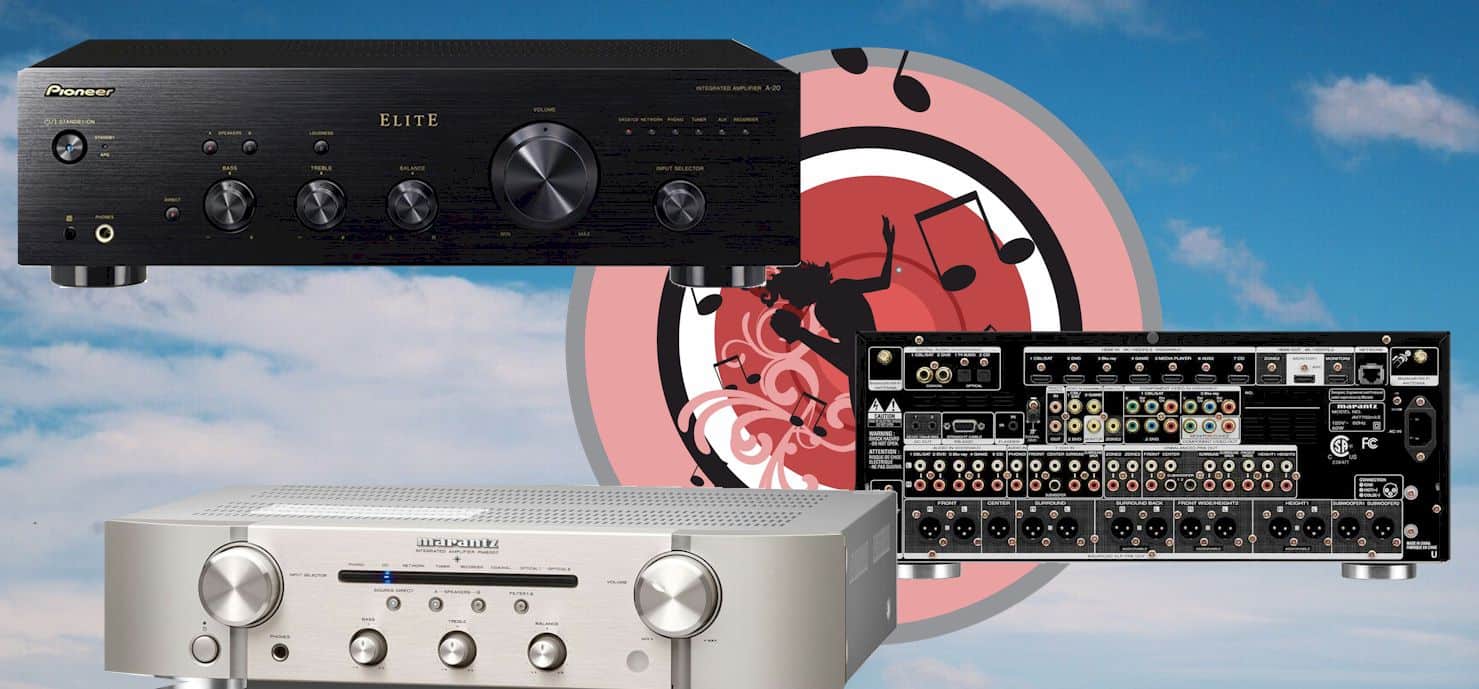Choosing between an amplifier vs receiver can be a bit tricky for the beginners out there. Even though both of them seem to be similar, there are lots of differences that impact the output audio.
If you are thinking of getting into music production or audio engineering, you must know about them. Because based on their use, you will decide on which one to buy for your needs.
That’s why I will go through a detailed overview of both these audio gears. Stick with me till the end to know all about them so you can choose one for your needs.
Related: How to connect a subwoofer to receiver without subwoofer output
How to connect a subwoofer to an old amplifier
Contents
Amplifier vs Receiver, What is the difference
First of all, let’s look at the differences between each of these pieces of equipment. I put the differences first so you could decide on one quicker if you are in a hurry to buy one. So, without wasting much time, let’s check out the differences.
Let me tell you something right away, you can consider all receivers amplifiers, but no amplifier works like a receiver. What I mean by that is, you get every function of an amplifier on a receiver, but it doesn’t go the opposite way.
In technical terms, a receiver has multiple functionalities like amplifying, tuning, preamp, radio inputs, volume controls, and so on. But an amplifier does only one task: amplifying audio signals for better sound quality.
Now, which one does what function? We will get to that later in this article. Here, let’s only talk about the differences and similarities.
The similarity in both these is that they have the same basic function. They both are used for improving the sound quality of your speakers, tv, or any other audio equipment you wish to use. And the differences are as follows.
- Amplifiers can only amplify the audio signals for your speakers and don’t have any other functionality on them. At the same time, receivers have different functionalities, including amplification of audio signals.
- With amplifiers, you don’t get a complete unit; you still have to get preamps, tuners, and other audio gears. But with a receiver, you get all in one. So, in this sense, receivers are much more cost-effective than amplifiers.
- Along with cost-effectiveness, receivers are also space-saving units. While with amplifiers, you will have to leave room for the other gears as well.
- Freedom of controllability and options is better on an amplifier. As you can upgrade and customize each of your components if you don’t feel satisfied. You may get good tuning facilities with a receiver, but the preamp might not be as good. In such cases, you are stuck with a receiver or have to change the unit completely.
- Amplifiers do their job better than receivers if you are buying them at a similar price point. Because amplifiers have to focus on one thing, they put out better results for you than a receiver that has to do a lot of stuff. The multi-functionality may impact the quality of operation a receiver does.
Now, the real question here is which one to choose? Well, if you want the best possible quality in your audio goes for amplifiers. But if you want to save up space and some money, then a receiver is a better option. That’s the easiest way you can choose between these two items.
However, if you are still confused, then let’s get on with the details of both these audio gears. I am pretty sure going through that will clear all your doubts. Let’s get going.
Related: Best stereo amplifier under $1000
What is an amplifier?
An amplifier is a device that can amplify audio signals coming from sources and produce better sound quality through speakers and headphones. The devices use electricity to boost the power of the audio signals. So, you get to hear better quality sounds with the same speakers and sources.
While you may not even know, but amplifiers can sometimes be a part of your audio system internally as well. You can have amplifiers on your mixers, headphones, speakers, etc. Although not every piece of equipment has an amplifier, so you may need to buy one additionally.
Related: Best Preamps for Turntables
But why buy an amplifier?
Well, the main reason is to get better sound quality. If you are an audiophile and the slightest details in the sound matter to you, you must get an amplifier.
Also, if you plan to work with music or audio, there is no roundabout way for you other than buying an amplifier. And some speakers and sound systems don’t even work without amplifiers, so you have to get one in such cases.
You can see a lot of varieties in amplifiers. What I will be sharing here are the ones that are standalone amplifiers. Standalone amplifiers are the ones that you buy separately and don’t come integrated into any device.
There are typically three types of amplifiers you can get. One is a preamplifier or popularly known as a preamp. These amplifiers usually amplify the lower-level signals coming from microphones or instruments. The use of preamp is mostly done for recording purposes.
Another amplifier type is the power amplifier which takes the recorded preamp signals and amplifies them. These are signals that you get from music, audio files, tv, movies, and whatnot. A power amplifier works on those signals to give you the best possible audio quality from your speakers.
Lastly, there is an integrated amplifier which is a combination of both preamp and power amp. So, if you need both the functionality of them, then you go for an integrated amplifier.
Unless you are a professional musician or a recording engineer, you will probably need a power amplifier because most sound systems or home theater systems require a power amplifier to work. And a power amplifier does the job perfectly with the best quality output for you.
So, that was all about amplifiers. Now, let’s get going with receivers to know a bit about them.
What is a receiver?
The receiver is a similar device, just like the amplifier, but it does a lot more than an amplifier. Usually, receivers have the amplification function on them along with a radio tuner at least. They can even have a preamp, input selection, different volume controls as well.
One of the main differences you can do is that AV receivers are known to do a similar task for video signals. This means receivers can process the video signals and turn them into something better to put out on your tv screen or monitor.
Now when and why should you buy a receiver? Are there any benefits?
Well, the answer is yes. There are lots of benefits of having a receiver. You can get better sound quality and performance from your devices, whether it’s your speakers or your tv or monitor.
And in some cases, it is compulsory to have a receiver. For example, you must have a receiver to operate the system properly with a surround sound system. Some home theater systems don’t even work without a receiver at all, so you have to buy one for your system to work.
When it comes to receivers, there are typically two types of receivers you can get. One is a stereo receiver, and the other is an AV receiver.
With a stereo receiver, what you get is two amplifiers for different channels with radio tuners. They pretty much work like integrated amplifiers and do the work individually for two different channels.
On the other hand, an AV receiver does a bunch of stuff. First of all, it powers up a whole home theater system and works as the control unit for the system. Aside from that audio signals, an AV receiver also deals with video signals.
For the most part, in an AV receiver, you get multiple amplifiers, one for each home theater system channel. This can vary depending on the brand and model of the receiver you choose. The main goal usually is to put out the best possible surround sound quality out there.
Also, these receivers have different codecs to put out the best sound quality for you. You might have heard of Dolby Atmos or DTS codecs. These are installed on the receivers, and they can hugely impact the quality of the sound.
Usually, you can get stereo receivers for your audio needs, but AV receivers are the way to go if you choose receivers over amplifiers.
And that’s all you will ever need to know about receivers.
Verdict
In short, amplifier vs. receiver isn’t that difficult decision to make when you know what they are. And if you know your needs, the choice becomes much easier. For those who are still struggling with the decision, here’s a quick recap of the solution.
Go for an amplifier if you have to work on music such as music production, recording engineer, audio editing, or musician. They will give you the best quality in terms of audio that you can’t get from a receiver. Also, you can get amplifiers if you only listen to music and prefer it that way.
But if you are looking for the best experience in watching movies or shows on your home theater system, go for a receiver. This is the simplest way to decide between these two items.

Graduated with a Bachelor of Audio Engineering and Sound Production. He has worked with a number of studios as a Recording Engineer, with over 10 years of servicing experience in both re-recording mixing and sound editing.


the artical was very informative and helped me choose which device i needed best i give it 5 stars